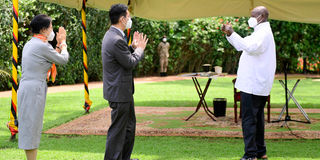Shift in China foreign aid policy a chance to reboot

President Museveni (right) waves to the Chinese officials following a meeting at State House Entebbe on Friday. PHOTO/PPU
What you need to know:
The issue: Foreign aid
Our view: As China doles debt strategically, it should be in our best interests as a country to step away from the precipice. This can only be achieved if borrowed funds are put to good use.
The Government of Uganda (GoU) has welcomed news of the paradigm shift in China’s foreign aid policy with great enthusiasm. Last November, China announced nine development programmes that recipients of its overseas lending stand to profit from. This past week, President Museveni told the Chinese Ambassador to Uganda Zhang Lizhong that, “[China] can come in on the issue of poverty eradication; because in the past [you] were supporting mainly infrastructure”. Nearly a decade ago in 2013 Government was steadfast in its optimism when China made the Belt and Road Initiative (BRI) the centrepiece of its foreign policy. China’s signature diplomatic initiative encouraged recipient countries such as Uganda to hedge their bets by making infrastructural developments.
As the term infrastructure became part of the furniture of Uganda’s budget themes, the erection of capital projects such as power grids, roads and bridges was accompanied by jobless growth. The government had or rather still hopes that investment in infrastructure will help push the cost of capital down for businesses, and that this attractiveness for companies to invest will translate into creation of jobs.
Yet rather than move from the red to black, Uganda looks to have saddled itself with unsustainable debt whilst also increasing its dependency on China. It’s widely feared that our strategic assets could well be targeted as collateral in some of the deals being dangled. This after all has been the order of the day in other heavily indebted poor countries.
In fact, a study carried out by the International Monetary Fund (IMF) from 2013 and 2016 found that the public debt of heavily indebted poor countries, Uganda inclusive, ballooned from 6.2 percent to 11.6 percent on China’s watch.
The temptation is to think that the paradigm shift gives Ugandan authorities a chance to reboot as the spectre of debt-trap diplomacy continues to hover ever so menacingly. Indeed, the danger is to think that this shift will offer a credible alternative to the trickle-down policy of pumping resources into infrastructural projects and hoping that jobs will emerge on the other side. With no guarantee that cronyism and kickbacks will be decisively addressed, this could yet be trickle-up economics in a development garb.
Uganda’s debt stock has increased exponentially (from Shs14.257trillion in 2000 to Shs35.3 trillion in 2017) and is forecasted to breach the 50 percent threshold in relation to GDP this year.
As China doles debt strategically, it should be in our best interests as a country to step away from the precipice. This can only be achieved if borrowed funds are put to good use. Mechanisms ensuring efficient use of the said borrowed funds have to be instituted. Short of that, the much-vaunted reboot will yield little or no tangible results.
Our commitment to you
We pledge:
- To be accurate and fair in all we do.
- To be respectful to all in our pursuit of the truth.
- To refuse to accept any compensation beyond that provided by Monitor Publications Ltd. for what we do in our news gathering and decision-making.
Further, we ask that we be informed whenever you feel that we have fallen short in our attempt to keep these commitments.




